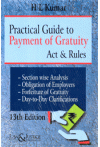- Author(s): H.L. Kumar, Gaurav Kumar
- Publisher: Universal LexisNexis
- Edition: 13 Ed 2024
- ISBN 13 9788119129478
- Approx. Pages 342 + Contents
- Format Paperback
- Approx. Product Size 24 x 16 cms
- Delivery Time 3-5 working days (within Kerala & South India) (Others 7-9 days)
- Shipping Charge Extra (see Shopping Cart)
.............................................................................................................................
Description
* Section wise Analysis
* Obligation of Employers
* Forfeiture of Gratuity
* Day-to-day Clarifications
There has been delay in bringing our Thirteenth Edition of Payment of Gratuity Act, 1972. This has been mainly because of Covid-19 pandemic which has adversely affected the commercial activities. However, there have been some important judgments interregnum which have been incorporated in this edition and the cases as enlisted hereafter bear the testimony about the edition of ratio decidendi of more important cases. It is pertinent to state here that the word 'Gratuity' in its etymological sense means a gift especially for services rendered or return for favours received. In the early stages in the adjudication of industrial disputes, gratuity was treated as a gift made by the employer at his pleasure and the workmen had no right to claim it. But in the gradual process of industrial adjudication a claim for gratuity is treated as being a legitimate claim which the workmen may make and which in appropriate cases may give rise to an industrial dispute. In Garment Cleaning Works v. Its Workman, AIR 1962 SC 673, it was observed that gratuity is not paid to the employees gratuitously or merely as a matter of boon. It is paid to him for the service rendered by him to the employer. The same view was expressed in Bharat Khand Textile Mfg. Co. Ltd. v. Textile Labour Association, Ahmedabad, AIR 1960 SC 833, and Calcutta Insurance Ltd. v. Their Workmen, AIR 1967 SC 1268. The Supreme Court in Delhi Cloth & General Mills Co. Ltd. v. Their Workmen, 1970 Lab IC 787 (SC), has summarized the view thus
. ...........................................................................................................................
Contents
The Payment of Gratuity Act, 1972
1. Short title, extent, application and commencement
2. Definitions
2A. Continuous Service
3. Controlling authority
4. Payment of gratuity
4A. Compulsory Insurance
5. Power to exempt
6. Nomination
7. Determination of the amount of gratuity
7A. Inspectors
7B. Powers of Inspectors
8. Recovery of gratuity
9. Penalties
10. Exemption of employer from liability in certain cases
11. Cognizance of offences
12. Protection of action taken in good faith
13. Protection of gratuity
13A. Validation of payment of gratuity
14. Act to override other enactments, etc.
15. Power to make rules
Day to Day Clarifications
Obligation of Employers under the Payment of Gratuity Act, 1972
1. To give notice of application of the Act to the Controlling Authority
2. To Make Payment of Gratuity to the Employee or his/her nomiee
3. To determine the amount of gratuity
4. To deposit the gratuity of a deceased employee under certain circumstances
5. To give notice of opening, change or closure of establishment
6. To display notice
7. An Opportunity of Hearing has to be given to an Employee before Forfeiting his Gratuity
8. To obtain nomination from the employees
9. To Intimate the Employee when his Claim for Gratuity is Rejected
10. To display the abstract of the Act and Rules
11. Intimation to Authority about Payment of gratuity
12. Penalties
The Payment of Gratuity (Central) Rules, 1972
Calculation of Gratuity
Subject Index
.............................................................................................................................
Author Details
H.L. Kumar, Advocate Supreme Court of India, Editor, Labour Law Reporter
Gaurav Kumar, MBA, LL.M., Advocate

